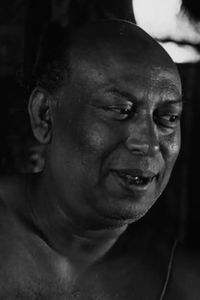Tulsi Chakraborty, a notable individual, entered this world in a quaint village nestled in the picturesque state of West Bengal, where his father, an Indian Railway employee, held a transferable position, resulting in the family's regular relocation. This nomadic lifestyle meant that Chakraborty would frequently spend extended periods with his paternal uncle, a skilled Tabla player and employee of the renowned Star Theater, in the vibrant city of Kolkata.
As a young individual growing up in the vibrant city of Kolkata, Chakraborty was afforded the unique opportunity to delve into the world of commercial theater through his uncle's esteemed connections within the industry.
Consequently, he would frequently attend performances by some of the most talented and renowned actors of that era, an experience that would undoubtedly play a significant role in shaping his nascent passion for acting.
This exposure would ultimately culminate in his screen debut in the 1932 film "Punarjanmo", marking the beginning of a remarkable journey that would see him make a lasting impact on the world of cinema.
Noted Bengali cinema stalwart Chakraborty's career-defining moment arrived with the film "Manmoyi Girls School", a pivotal role that not only propelled him to unparalleled stardom but also solidified his position as one of the most in-demand character and comedic actors in Bengali cinema. He went on to captivate audiences with an impressive array of film appearances, including the iconic 1955 classic "Pather Panchali", where he brought to life the endearing character of Prassana-Gurumoshai, Apu's wise and compassionate teacher at the village school.
As a renowned actor, Chakraborty's impressive performance in Satyajit Ray's 1957 film "Paras Pathar" marked a significant milestone in his illustrious career, effectively demonstrating his extraordinary histrionic talents.
In this critically acclaimed film, Chakraborty took on the lead role of Paresh Dutta, a humble and unassuming petty bank clerk whose life takes an unexpected turn when he stumbles upon the fabled Philosopher's Stone. As Paresh Dutta, Chakraborty masterfully portrayed the protagonist's transformation from an ordinary individual to a celebrity, navigating the treacherous landscape of fame, fortune, and ultimately, downfall.
Through his nuanced and captivating performance, Chakraborty brought depth and complexity to the character of Paresh Dutta, rendering the film's themes of identity, morality, and the human condition even more poignant and relatable.
Noted Bengali thespian, Prasenjit Chakraborty, embarked on a remarkable journey, gracing the silver screen with his presence in an astonishing 300 plus films and theatrical productions, yet, his innate shyness and introverted personality hindered his ability to secure substantial financial gains.
Noted Bengali film personality, Chakraborty, persevered in his career despite facing numerous challenges until his eventual demise. In the aftermath of his untimely passing, his widow was beset by poverty, struggling to make ends meet. However, her fortunes took a turn for the better when another prominent figure in the Indian film industry, Mithun Chakraborty, came forward to offer his support. Mithun, in a gesture of kindness and generosity, provided his widow with a monthly stipend of five hundred rupees, a sum that proved to be a lifeline for her until her own eventual passing.
















